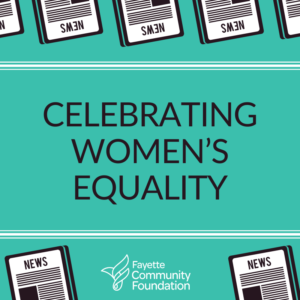Celebrating Women’s Equality Day
 Did you know that August 26th is Women’s Equality Day? It’s a commemoration of the Nineteenth Amendment to the United States Constitution, which prohibits the states and federal government from denying the right to vote to citizens on the basis of sex.
Did you know that August 26th is Women’s Equality Day? It’s a commemoration of the Nineteenth Amendment to the United States Constitution, which prohibits the states and federal government from denying the right to vote to citizens on the basis of sex.
This important day paved the way for many more milestones for women and people of color as they gained more rights and opportunities – which meant more ways for more people to support and uplift their communities.
Today, most of us have the option to live the lives we want, and we don’t often have to think about moments in history like women earning the right to vote. We haven’t consciously chosen to forget about it: we’re just so far removed from 1920 – lucky us! If you’d like to get a small sample of what women have gone through, ask a woman who was an adult in the 1960s and early 1970s what it was like to get a credit card in her own name. Until 1974 (which still feels like “recent history” to many of us), banks could refuse to issue a credit card to an unmarried woman without a male cosigner. Suffice it to say, we’ve come a long way and it’s important to recognize the contributions of women throughout history, throughout Community Foundations across the United States, and throughout Fayette County.
Do Women Give More?
According to a study completed by IUPUI Women’s Philanthropy Institute under the Lilly Family School of Philanthropy, research shows that men and women have different patterns of giving. Essentially, gender does shape your personal giving philosophy. In nearly every category, women are more likely to give to charity and often give more than men under similar circumstances – for example: being married or single, with a degree or high school diploma. As a woman’s income rises, she’s more likely to donate to secular causes and increases in income increase the likelihood that she will give to educational, environmental, and basic needs causes. These differences are relatively uniform across ethnicities. Research also shows that adult daughters will give more frequently than adult sons if their parents are regular donors to charitable causes. These differences are important for community organizations that rely on donations to understand and appreciate. Women are a powerful supporter of local charities.
Charity Leadership & Foundation Leadership
According to the Council on Foundations’ “Analysis of Women and People of Color in the Philanthropic Sector,” women have found ample employment opportunities within the world of philanthropy. Women make up about 57% of Foundation employees, but research shows that they are not equally represented among all levels of employment – which is consistent with other industries and sectors. This hasn’t changed much in recent years, but several Community Foundations within East Central Indiana (including our own Fayette Community Foundation) have defied the statistical norm and have women in leadership and executive roles.
The Council on Foundations suggests charitable organizations work to be intentional in their efforts to attract and hire from a diverse talent pool and those working within the sector should function as mentors to raise the next generation of diverse philanthropic leaders. One thing that we can all agree on is that bringing in people from different backgrounds and experiences helps us see unique perspectives, avoid unintentionally excluding people from our philanthropic work, and provides additional problem-solving opportunities for your team.
Community Opportunities
What can we do as a county to make participation in philanthropy accessible to more people? First, avoid making assumptions about people. If you have a need, are looking for support, or have an open role to fill on your board or staff, ask a variety of people to help. Educate them on how they can contribute and let them tell you if they’re the right fit. If you assume what the response will be based on someone’s age, gender identity, ethnicity, or some other factor, you may exclude someone who might be the perfect fit for your team or offer precisely the right solution you need. Simply put: be inclusive.
Next, take a look at your own giving patterns. Do you currently support organizations within our community? Would you like to do more? Examine the Fayette Community Foundation’s list of endowments to get an idea of currently existing areas our generous donors support and where you can join them. You may see quite a few funds that were established to honor incredible, powerful women from our own community. Endowments like these were created to support certain causes or charities that benefit us all for generations.
Finally, look for ways to be positive role models for younger generations. Talk about your charitable giving with your family so that they understand your wishes and can perhaps join you in supporting those endeavors. Teach children and grandchildren why you give and why it’s important to your family’s culture. If you’re in a leadership position – male or female – invite the youth in. Find ways to connect and share about what you do so that young people in our community see opportunity here at home, feel included, and start thinking about philanthropy and community support. A small effort in inclusivity will have a ripple effect across Fayette County.
Let’s Get Started
Would you like to honor a special woman in your life with gift in her memory or honor? We can help you get started – whether that’s setting up a fund, learning about where you can lend your leadership skills in the community, or simply setting up monthly subscription-based donations to help where it’s needed most. To learn more, give us a call at (765) 827-9966 or email info@givetofcf.com.
– Alexandra Pflug, Executive Director and CEO, Fayette Community Foundation